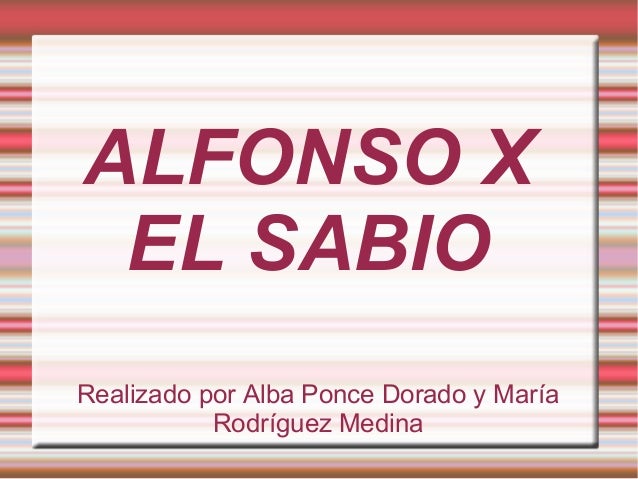Alfonso X El Sabio Espanol

07/01/19: Universidad Alfonso X El Sabio: Academic profile, reviews by international. Homepage: www.uax.es/internacional/general/espanol/indice.html.
Portrait of Alfonso X from the codex Tumbo 'A' de Santiago (Dated between 1229 and 1255) Civil war Throughout his reign, Alfonso contended with the nobles, particularly the families of, and, all of whom were formidable soldiers and instrumental in maintaining Castile's military strength in frontier territories. According to some scholars, Alfonso lacked the singleness of purpose required by a ruler who would devote himself to organization, and also the combination of firmness with temper needed for dealing with his nobles. Others have argued that his efforts were too singularly focused on the diplomatic and financial arrangements surrounding his bid to become Holy Roman Emperor. Alfonso's eldest son, died in 1275 at the against the Moroccan and invasion armies, leaving two infant sons. Alfonso's second son, claimed to be the new heir, in preference to the children of Ferdinand de la Cerda, basing his claim on an old Castilian custom, that of.
Alfonso preferred to leave the throne to his grandsons, but Sancho had the support of the nobility. A bitter civil war broke out resulting in Alfonso's being forced in 1282 to accept Sancho as his heir instead of his young grandsons; only the cities of, and remained faithful to him. Son and nobles alike supported the when he tried to unite the nation in a crusade; and when he allied himself with, the ruling, they denounced him as an enemy of the faith. A reaction in his favor was beginning in his later days, but he died defeated and deserted at Seville in 1284, leaving a will, by which he endeavored to exclude Sancho, and a heritage of civil war. Economic policy In 1273, he created the, an association of some 3,000 petty and great sheep holders in Castile, in reaction to less wool being exported from the traditional sites in England. This organization later became exceedingly powerful in the country (as wool became Castile's first major exportable commodity and reported a trade surplus, called 'white gold', as the wool amount was critical to the health of the population during the winter), and eventually its privileges were to prove a deadly wound in the Castilian economy.
Alfonso X El Sabio Wikipedia En Espanol
One side effect of the quickly expanding sheep herds was the decimation to the Castilian farmland through which the sheep grazed. The original function of the Mesta was to separate the fields from the sheep-ways linking grazing areas. Legislative activity As a ruler, Alfonso showed legislative capacity, and a wish to provide the kingdoms expanded under his father with a and a consistent judicial system.

The Fuero Real was undoubtedly his work. He began medieval Europe's most comprehensive code of law, the, which, however, thwarted by the nobility of Castile, was only promulgated by his great-grandson. Because of this, and because the Partidas remain fundamental law in the American Southwest, he is one of the 23 lawmakers depicted in the House of Representatives chamber of the. Military training.
The Book of Chess, Dice and Board Games. says 'Some historians have been only too quick to label him, most unfairly, as a brilliant intellectual who was bungling and inefficient in practical affairs.' Burns, Robert I., Alfonso X, King of Castile and Leon, 1221-1284., Scott, Samuel Parsons. Philadelphia: University of Pennsylvania Press.:82–83).:65–66).:54).:86–128).:327–328).
Bogdanov, Alexander (1996). Bogdanov's Tektology: Book! Hull: Centre for Systems Studies.:40 and 44n36).
^. ^.:31). Although Musser Golladay is not the first to assert that 1283 is the finish date of the Libro de Juegos, the a quo information compiled in her dissertation consolidates the range of research concerning the initiation and completion dates of the Libro de Juegos. Keller, John E. Cash, Annette Grant, 1943.
Lexington: University Press of Kentucky. References. Download the conjuring sub indo.
The CSI5.W Universidad Alfonso X El Sabio Trophy, qualifying test for the Longines FEI World Cup™, began on time at 7:30 p.m. On the first day of the VI edition of IFEMA MADRID HORSE WEEK. Many riders decided to participate in this class played under the “Fault & Time with one Jump Off” table and a height of 155 cm. Although the riders have gone calmly to ensure getting to the Jump Off, a fairly square course, has made them sweat to finish the course without fault. The third obstacle of the triple, has especially given several headaches, since almost nobody was able to beat it.
Such has been the difficulty, that out of 43 participants, only 7 riders have been able to finish the course without fault. The Jump Off, despite having only 7 participants, has been exciting and equally contested. The Frenchman Simon Delestre set the mark high enough riding Hermes Ryan and finishing the course in 42.38 seconds that seemed unbeatable. Mark McAuley and Jasco vd Bisschop got us out of our mistake getting the time to go under 8 hundredths. Julien Epaillard had the best time of the initial course with Usual Suspect d’Auge, and the pair did it again in the Jump Off despite the time marked by the Irish which seemed definitive.
Epaillard was able to finish an impeccable course in just 41.29 seconds, getting ahead both his compatriot and McAuley. Regardless of the result, the seven riders who have participated in this Jump Off are immediately qualified for the World Cup that will take place on Sunday. The first day of competition will be closed by the well-known CSI5. – W & CSI2. Six Bars. This special power class is one of the audience favorites as it fills the Main Arena with tension and emotion.